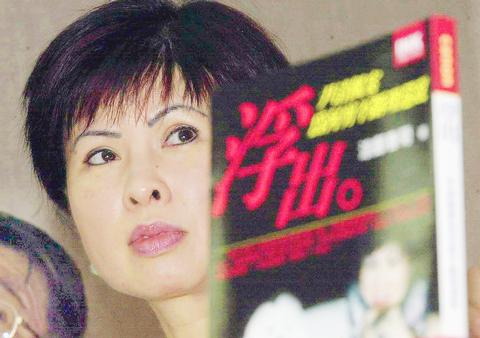A Taiwanese-German woman, long believed to be a key witness in the murder of navy Captain Yin Ching-feng (
Speaking at a press conference in Taipei yesterday to publicize her book, Surfacing: Mysteries about the Yin Ching-feng case, Tu Cheng Chun-chu (涂鄭春菊) said she hoped that her memoirs would help remove the label "key witness," which has been imposed upon her since the murder of Captain Yin.

PHOTO: CHIANG YING-YING, TAIPEI TIMES
"My book is entitled `Surfacing' mainly as a declaration of my determination to speak openly about what I know -- and don't know -- of the Yin case," Tu said at the press conference.
For the past seven years, Tu has been one of the key witnesses in the Yin case. Part of the reason is that Tu was the person Yin planned to visit before he went missing.
"On that day, Dec. 9, around 7:00am, Yin Chin-feng called and said that he would be over in 10 minutes ... however, he never showed up," Tu wrote in her book.
Others also wondered why Tu left Taiwan immediately after one of Yin's colleagues informed her of the death. Yin's body was found drifting off the coast of Suao in Ilan County later that day, apparently killed by a blow to the back of the head.
"Yin talked with me on the phone before he died. But until I was informed of his death, I had no idea what had happened and I wasn't involved. I was also curious about what had happened to Yin," Tu said.
Tu said the reason she left the country following Yin's murder was because the navy had instructed her to do so.
"The navy told me that if any accident befell Yin, I would never be able to return to Taiwan again. And I asked the naval procurement officer `what does that have to do with me?'" Tu wrote in her book. "But he refused to give me an explanation."
At the time, Tu was in Taiwan negotiating with the navy over spare parts for four German-made minesweepers. She worked as a broker on behalf of a German arms manufacturer. Yin was sent by the navy to talk with her, since he was then the director of the navy's procurement office.
Tu, however, denied that she was an arms dealer.
"I was just handling the legal affairs of the deal," Tu said.
When asked by one reporter if she knew more about how Yin died and more details related to the case, Tu said, "If I knew I would tell you."
"All I know are some details related to the navy's procurement scandals during that period," Tu said.

A magnitude 7.0 earthquake struck off Yilan at 11:05pm yesterday, the Central Weather Administration (CWA) said. The epicenter was located at sea, about 32.3km east of Yilan County Hall, at a depth of 72.8km, CWA data showed There were no immediate reports of damage. The intensity of the quake, which gauges the actual effect of a seismic event, measured 4 in Yilan County area on Taiwan’s seven-tier intensity scale, the data showed. It measured 4 in other parts of eastern, northern and central Taiwan as well as Tainan, and 3 in Kaohsiung and Pingtung County, and 2 in Lienchiang and Penghu counties and 1

A car bomb killed a senior Russian general in southern Moscow yesterday morning, the latest high-profile army figure to be blown up in a blast that came just hours after Russian and Ukrainian delegates held separate talks in Miami on a plan to end the war. Kyiv has not commented on the incident, but Russian investigators said they were probing whether the blast was “linked” to “Ukrainian special forces.” The attack was similar to other assassinations of generals and pro-war figures that have either been claimed, or are widely believed to have been orchestrated, by Ukraine. Russian Lieutenant General Fanil Sarvarov, 56, head

FOREIGN INTERFERENCE: Beijing would likely intensify public opinion warfare in next year’s local elections to prevent Lai from getting re-elected, the ‘Yomiuri Shimbun’ said Internal documents from a Chinese artificial intelligence (AI) company indicated that China has been using the technology to intervene in foreign elections, including propaganda targeting Taiwan’s local elections next year and presidential elections in 2028, a Japanese newspaper reported yesterday. The Institute of National Security of Vanderbilt University obtained nearly 400 pages of documents from GoLaxy, a company with ties to the Chinese government, and found evidence that it had apparently deployed sophisticated, AI-driven propaganda campaigns in Hong Kong and Taiwan to shape public opinion, the Yomiuri Shimbun reported. GoLaxy provides insights, situation analysis and public opinion-shaping technology by conducting network surveillance

‘POLITICAL GAME’: DPP lawmakers said the motion would not meet the legislative threshold needed, and accused the KMT and the TPP of trivializing the Constitution The Legislative Yuan yesterday approved a motion to initiate impeachment proceedings against President William Lai (賴清德), saying he had undermined Taiwan’s constitutional order and democracy. The motion was approved 61-50 by lawmakers from the main opposition Chinese Nationalist Party (KMT) and the smaller Taiwan People’s Party (TPP), who together hold a legislative majority. Under the motion, a roll call vote for impeachment would be held on May 19 next year, after various hearings are held and Lai is given the chance to defend himself. The move came after Lai on Monday last week did not promulgate an amendment passed by the legislature that